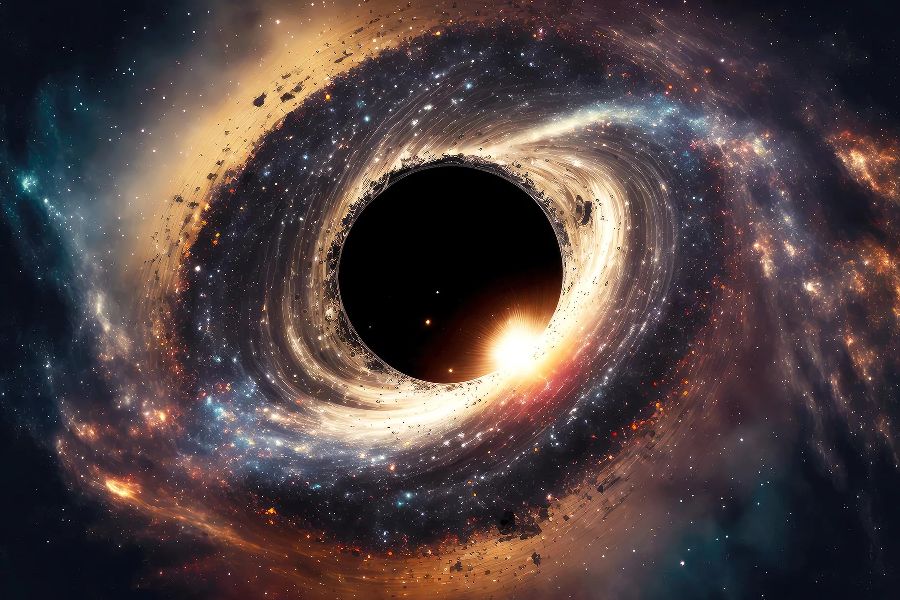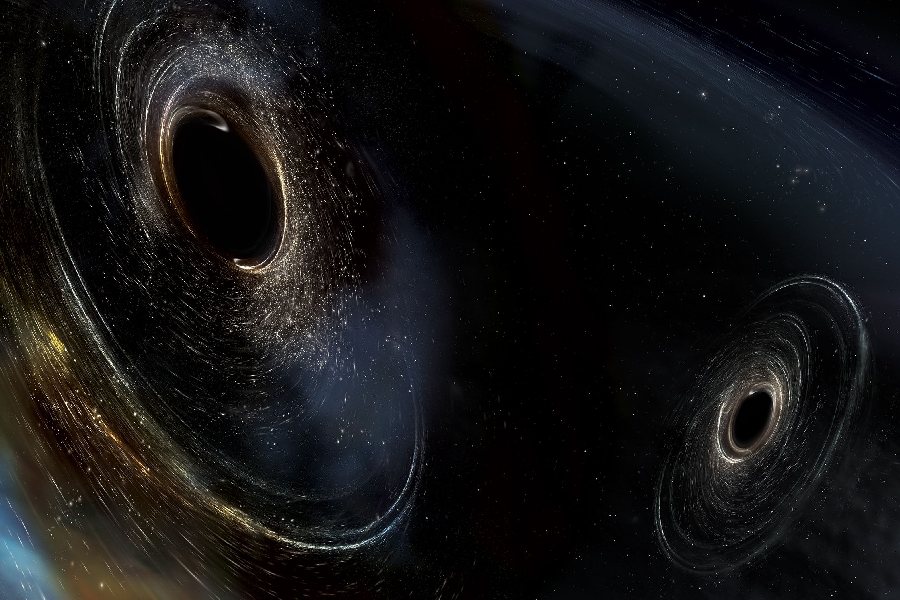Black holes are the most enigmatic objects in our universe. Their extreme gravities trap anything that ventures too close, even light itself. Yet rather than dead stellar corpses, black holes lead a dynamic existence at the hearts of galaxies like our Milky Way. This raises an intriguing question about the existence of black holes. Do black holes die? And if they do evaporate, does it happen in the blink of an eye, or do they undergo a slow and peculiar death? What processes could make a black hole expire?
This article explores the potential life cycles of these dark denizens of the cosmos, weighing evidence from astrophysics to quantum mechanics. We will tackle what makes black holes shine, grow, merge, and potentially fade away.
We will investigate whether looping back through white holes could signify the rebirth, not death, of these dark destroyers. Stick around as we investigate one of the cosmos’ greatest mysteries, unveiling the life and potential afterlife of black holes.

Do Black Holes Die? – The Life Cycle of Black Holes
Yes, black holes can eventually die, but the death of black holes is a very slow process. The way they die depends on their size. Smaller black holes can evaporate over a very long time due to a process called Hawking radiation, where they gradually lose mass and energy.
Larger black holes might take billions or even trillions of years to evaporate. So, while black holes can technically die, it happens over incredibly long timescales that are difficult for us to fully comprehend.
Accretion and Growth
Matter falling into black holes
Black holes can grow by gravitationally attracting and swallowing surrounding gas and dust clouds. As matter spirals inward, it heats up, emitting radiation that can be detected from Earth.
The accretion process releases a tremendous amount of energy as the mass gets converted into radiation within the black hole’s gravitational field. This conversion reaches over 40% efficiency, much higher than nuclear fusion in stars.
The more interstellar gas is available, the faster black holes accumulate mass, leading to periods of brighter emission. When less matter gets supplied, the black hole goes quiet to later reignite upon getting new fuel reserves as the surrounding stellar cycles continue. So, how long does a black hole last?
The longevity of this start-stop cycle influences how long the black hole lasts. The length of time this accretion process lasts depends on available interstellar gas reserves, which fuel the growth and activity cycles of these gravitational wells over cosmic timescales.
Quasars and active galactic nuclei
Quasars are extremely luminous objects, emitting more energy than entire galaxies. Quasars are powered by supermassive black holes with intense accretion rates. Unfathomable amounts of material funnel into these black holes, driving powerful outflows that influence galactic evolution.
Central supermassive black holes appear as brighter active galactic nuclei, although they may be partially obscured from view by thick rings of gas and dust shrouding the accretion process. Variations in this obscuration contribute to observed differences in galaxies’ brightness and emitted radiation profiles.
Hawking Radiation
Stephen Hawking’s theory
In 1974, Stephen Hawking studied quantum effects right at the edge of black holes. He predicted black holes should emit particles and energy, now called Hawking radiation. This radiation would cause black holes to very slowly shrink and lose mass over billions of years.
Hawking’s work linked the thermodynamic concept of temperature with the gravitational physics of black holes. It demonstrated that black holes have entropy and temperature like ordinary physical systems. This discovery greatly impacted black hole physics and quantum gravity theories.
Gradual loss of mass
Hawking radiation involves particle-antiparticle pairs generated by quantum fluctuations near the black hole. One partner gets captured, and the other escapes as radiation, carrying a small amount of energy and mass away from the black hole as radiation gets emitted. So, do black holes explode when they die?
The black hole loses mass little by little, leading it to ultimately evaporate away into the emitted radiation. But the immense time span for total evaporation is far longer than our universe’s current age for most black holes. Only theoretical microscopic quantum black holes would evaporate quickly.

Stellar Black Hole Mergers
LIGO and Virgo detections
The LIGO and Virgo observatories have detected gravitational waves from over 50 stellar-mass binary black hole mergers. As black holes spiral together and combine. They send out intense ripples in spacetime that reach Earth, giving insights into these powerful events.
These black hole collisions release truly tremendous amounts of energy. Up to many times the total light output from all the stars in the observable universe. Some of this gets converted into a final black hole with increased total mass plus powerful gravitational waves spreading out through the cosmos.
Impact on black hole lifespan
When black holes merge, their individual masses get added together, creating an even larger combined black hole. Mergers don’t shorten a black hole’s total lifespan – rather, the opposite. Larger event horizons emit even less Hawking radiation, meaning longer evaporation times.
Over billions of years, black holes likely undergo multiple merger events as they get gravitationally captured into binaries inside dense stellar clusters of galaxies.
Each collision progressively builds up the black hole’s bulk, helping drive it toward becoming intermediate-mass and the supermassive variety detected at galactic centers. So mergers help black holes grow giant.
The Controversy: Do Black Holes Die?
The question of whether black holes die is a topic of ongoing scientific debate and exploration. According to classical general relativity, black holes are objects with such strong gravitational forces that nothing, not even light, can escape their gravitational pull. In this framework, black holes don’t die; they persist indefinitely.
However, when considering quantum mechanics, especially through the lens of Hawking radiation proposed by physicist Stephen Hawking in 1974, the idea that black holes can gradually lose mass and energy over time emerges.
The controversy arises from the fact that this theoretical prediction implies that black holes can eventually vanish completely, contradicting the classical notion that they are eternal. The timescale for such evaporation is incredibly long for stellar-mass black holes, making it practically unobservable. However, for very small black holes, the process would be much quicker.
The resolution of this controversy involves a better understanding of the interplay between general relativity and quantum mechanics, particularly in extreme gravitational conditions.
Alternative Theories and Speculations
As we probe deeper into what happens when black holes die, the firewall paradox illustrates conflicts between quantum theory and relativity when applied to black holes. The prediction of firewalls destroying matter at horizons likely signals missing pieces in current physics rather than reflecting reality.
Consumed information vanishing forever contradicts quantum theory. Proposed solutions include information leakage before evaporation or exotic tunnels to other universes. Significant debate continues around resolving this core paradox.
Concepts like wormholes and white holes could recycle matter across universes. While speculative, such structures could offer potential rebirth rather than true death for consumed black holes.
Conclusion
As we conclude our investigative journey into the question about black holes, more specifically, do black holes die, we find the life and potential afterlife of these gravitational monsters encompass some of the deepest mysteries in physics. However, through Hawking’s theory, we come to the conclusion that black holes, one of the enigmatic and captivating entities in the universe, do die. But they die in a slow and strange way.
